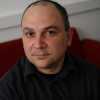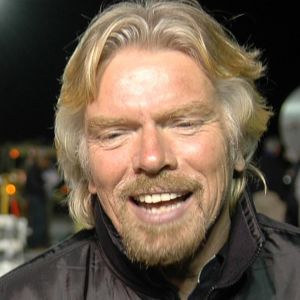Want to know what books David Goldberg recommends on their reading list? We've researched interviews, social media posts, podcasts, and articles to build a comprehensive list of David Goldberg's favorite book recommendations of all time.
1

In this fascinating book, the renowned astrophysicist J. Richard Gott leads time travel out of the world of H. G. Wells and into the realm of scientific possibility. Building on theories posited by Einstein and advanced by scientists such as Stephen Hawking and Kip Thorne, Gott explains how time travel can actually occur. He describes, with boundless enthusiasm and humor, how travel to the future is not only possible but has already happened, and he contemplates whether travel to the past is also conceivable. Notable not only for its extraordinary subject matter and scientific brilliance,... more In this fascinating book, the renowned astrophysicist J. Richard Gott leads time travel out of the world of H. G. Wells and into the realm of scientific possibility. Building on theories posited by Einstein and advanced by scientists such as Stephen Hawking and Kip Thorne, Gott explains how time travel can actually occur. He describes, with boundless enthusiasm and humor, how travel to the future is not only possible but has already happened, and he contemplates whether travel to the past is also conceivable. Notable not only for its extraordinary subject matter and scientific brilliance, Time Travel in Einstein’s Universe is a delightful and captivating exploration of the surprising facts behind the science fiction of time travel. less 
David GoldbergThat is a book that I really enjoyed, written by a friend of mine who was influential in my education. It isn’t primarily about cosmology, but has a very interesting bit about how the Universe might have started. Rich presents some really fascinating ideas – he knows a lot about time travel and relativity – and it’s a great layman’s book for understanding a lot of concepts in general relativity. (Source)
See more recommendations for this book...
2

A Nobel Prize-winning physicist explains what happened at the very beginning of the universe, and how we know, in this popular science classic.
Our universe has been growing for nearly 14 billion years. But almost everything about it, from the elements that forged stars, planets, and lifeforms, to the fundamental forces of physics, can be traced back to what happened in just the first three minutes of its life.
In this book, Nobel Laureate Steven Weinberg describes in wonderful detail what happened in these first three minutes. It is an exhilarating journey that begins... more A Nobel Prize-winning physicist explains what happened at the very beginning of the universe, and how we know, in this popular science classic.
Our universe has been growing for nearly 14 billion years. But almost everything about it, from the elements that forged stars, planets, and lifeforms, to the fundamental forces of physics, can be traced back to what happened in just the first three minutes of its life.
In this book, Nobel Laureate Steven Weinberg describes in wonderful detail what happened in these first three minutes. It is an exhilarating journey that begins with the Planck Epoch - the earliest period of time in the history of the universe - and goes through Einstein's Theory of Relativity, the Hubble Red Shift, and the detection of the Cosmic Microwave Background. These incredible discoveries all form the foundation for what we now understand as the "standard model" of the origin of the universe. The First Three Minutes examines not only what this model looks like, but also tells the exciting story of the bold thinkers who put it together.
Clearly and accessibly written, The First Three Minutes is a modern-day classic, an unsurpassed explanation of where it is we really come from. less 
Dan HooperSteve Weinberg is arguably the most brilliant physicist of the last many decades. He’s an absolute luminary. He also happens to be a really good writer and communicator. I’ve liked all of the books of his I’ve read, but I picked The First Three Minutes because it is the classic book about the Big Bang and the first three minutes of our universe’s history. (Source)

Tim RadfordNot only is it the beginning of the universe, it’s the beginning of books about the universe. (Source)

David GoldbergAnother one that has to be on any list like this is The First Three Minutes by Steven Weinberg, a Nobel Prize-winner. It’s a relatively slim volume, in which he describes what happened in the first three minutes of the Big Bang, as it was known and understood back then [1977]. We’ve learned a fair amount since then and some of the details in his original version are a little off, but the basic... (Source)
See more recommendations for this book...
3

Douglas Adams, Neil Gaiman | 4.54
At last in paperback in one complete volume, here are the five novels from Douglas Adams's Hitchhiker series.
"The Hitchhiker's Guide to the Galaxy"
Seconds before the Earth is demolished for a galactic freeway, Arthur Dent is saved by Ford Prefect, a researcher for the revised Guide. Together they stick out their thumbs to the stars and begin a wild journey through time and space.
"The Restaurant at the End of the Universe"
Facing annihilation at the hands of warmongers is a curious time to crave tea. It could only happen to the cosmically... more At last in paperback in one complete volume, here are the five novels from Douglas Adams's Hitchhiker series.
"The Hitchhiker's Guide to the Galaxy"
Seconds before the Earth is demolished for a galactic freeway, Arthur Dent is saved by Ford Prefect, a researcher for the revised Guide. Together they stick out their thumbs to the stars and begin a wild journey through time and space.
"The Restaurant at the End of the Universe"
Facing annihilation at the hands of warmongers is a curious time to crave tea. It could only happen to the cosmically displaced Arthur Dent and his comrades as they hurtle across the galaxy in a desperate search for a place to eat.
"Life, the Universe and Everything"
The unhappy inhabitants of planet Krikkit are sick of looking at the night sky- so they plan to destroy it. The universe, that is. Now only five individuals can avert Armageddon: mild-mannered Arthur Dent and his stalwart crew.
"So Long, and Thanks for All the Fish"
Back on Earth, Arthur Dent is ready to believe that the past eight years were all just a figment of his stressed-out imagination. But a gift-wrapped fishbowl with a cryptic inscription conspires to thrust him back to reality. So to speak.
"Mostly Harmless"
Just when Arthur Dent makes the terrible mistake of starting to enjoy life, all hell breaks loose. Can he save the Earth from total obliteration? Can he save the Guide from a hostile alien takeover? Can he save his daughter from herself?
Also includes the short story "Young Zaphod Plays It Safe". less 
Venkatesh RaoRereading this book is a way to reboot your brain anytime you’re feeling stale in your thinking. (Source)

Estelle FrancisThis is a tale with countless humorous moments, and it’s so bizarre that I instantly fell in love with it. (Source)

Marko RakarThis is the Bible of science fiction. It’s funny and anyone with the remotest interest in science fiction must read it. (Source)
See more recommendations for this book...
4

In the ten years since its publication in 1988, Stephen Hawking's classic work has become a landmark volume in scientific writing, with more than nine million copies in forty languages sold worldwide. That edition was on the cutting edge of what was then known about the origins and nature of the universe. But the intervening years have seen extraordinary advances in the technology of observing both the micro- and the macrocosmic worlds. These observations have confirmed many of Professor Hawking's theoretical predictions in the first edition of his book, including the recent discoveries of... more In the ten years since its publication in 1988, Stephen Hawking's classic work has become a landmark volume in scientific writing, with more than nine million copies in forty languages sold worldwide. That edition was on the cutting edge of what was then known about the origins and nature of the universe. But the intervening years have seen extraordinary advances in the technology of observing both the micro- and the macrocosmic worlds. These observations have confirmed many of Professor Hawking's theoretical predictions in the first edition of his book, including the recent discoveries of the Cosmic Background Explorer satellite (COBE), which probed back in time to within 300,000 years of the universe's beginning and revealed wrinkles in the fabric of space-time that he had projected. Eager to bring to his original text the new knowledge revealed by these observations, as well as his own recent research, Professor Hawking has prepared a new introduction to the book, written an entirely new chapter on wormholes and time travel, and updated the chapters throughout. less 
Richard BransonToday is World Book Day, a wonderful opportunity to address this #ChallengeRichard sent in by Mike Gonzalez of New Jersey: Make a list of your top 65 books to read in a lifetime. (Source)

Dan HooperEverybody knows Hawking’s greatest contributions: understanding that black holes radiate light and other particles, that they contain entropy and all these things that no one imagined before him. Hawking and Roger Penrose also worked out the Big Bang singularity, the very moment of creation. To hear him describe some of these things with his own word choices, his own phrasing—not to mention his... (Source)

Adam Hart-DavisWhen Stephen Hawking wrote A Brief History of Time..his publisher told him that every equation he left in would halve the number of readers (Source)
See more recommendations for this book...
5

In Bryson's biggest book, he confronts his greatest challenge: to understand—and, if possible, answer—the oldest, biggest questions we have posed about the universe and ourselves. Taking as territory everything from the Big Bang to the rise of civilization, Bryson seeks to understand how we got from there being nothing at all to there being us. To that end, he has attached himself to a host of the world’s most advanced (and often obsessed) archaeologists, anthropologists, and mathematicians, travelling to their offices, laboratories, and field camps. He has read (or tried to read) their... more In Bryson's biggest book, he confronts his greatest challenge: to understand—and, if possible, answer—the oldest, biggest questions we have posed about the universe and ourselves. Taking as territory everything from the Big Bang to the rise of civilization, Bryson seeks to understand how we got from there being nothing at all to there being us. To that end, he has attached himself to a host of the world’s most advanced (and often obsessed) archaeologists, anthropologists, and mathematicians, travelling to their offices, laboratories, and field camps. He has read (or tried to read) their books, pestered them with questions, apprenticed himself to their powerful minds. A Short History of Nearly Everything is the record of this quest, and it is a sometimes profound, sometimes funny, and always supremely clear and entertaining adventure in the realms of human knowledge, as only Bill Bryson can render it. Science has never been more involving or entertaining. less 
Fabrice GrindaI have lots of books to recommend, but they are not related to my career path. The only one that is remotely related is Peter Thiel’s Zero to One. That said here are books I would recommend. (Source)

David GoldbergWhat I really liked about A Short History of Nearly Everything is that it gives an excellent account of a lot of the personalities and the interconnectedness of important discoveries in cosmology and elsewhere. He does such a great job of bringing together our understanding of cosmology, evolution, paleontology, and geology in a very, very fluid way. (Source)
See more recommendations for this book...
Don't have time to read David Goldberg's favorite books? Read Shortform summaries.
Shortform summaries help you learn 10x faster by:
- Being comprehensive: you learn the most important points in the book
- Cutting out the fluff: you focus your time on what's important to know
- Interactive exercises: apply the book's ideas to your own life with our educators' guidance.




